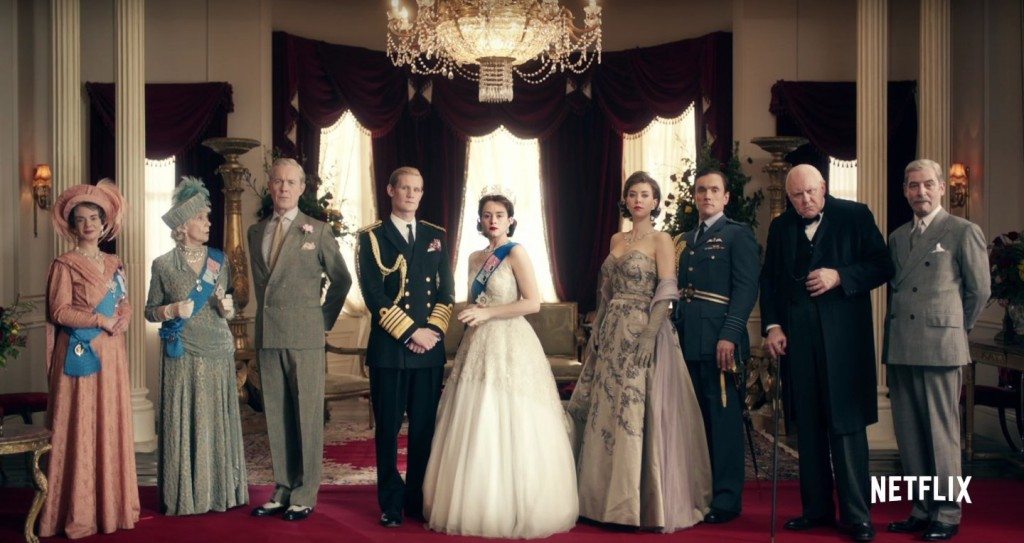From the very opening credits of Netflix’s ‘The Crown’, embellished with music immaculately composed by Oscar winner Hanz Zimmer, the show makes it abundantly clear that it is more fascinated with the crown and less with the head that it rests upon. And it’s recherché underpinnings would go on to explore both the intricacies and excesses of the monarchy as well as the unceasing fascination Britain and much of the rest of the world has with it.
Elizabeth Regina II, the longest reigning British sovereign of all time, was ushered into the global spotlight after the unforeseen death of her father King George VI, who was the subject of Tom Hooper’s ‘The King’s Speech’, diligently played here by ‘Mad Men’ vet Jared Harris. “Queens have always been better for the kingdom than Kings”, she’s told. And assuredly, she shares her name, which she vehemently states would not be changed to a regnal name, with Elizabeth I, who was responsible for England’s Golden Age. Elizabeth II would go on to become the target of much public scorn and consequent admiration at her reaction to the death of Diana, Princess of Wales in Stephen Frears’s ‘The Queen’. It is the first few years of that gap between those two films that the first season of ‘The Crown’, written by ‘Queen’ writer Peter Morgan, follows.
We start with a wedding. The unanticipated and mildly unpopular union of the King’s eldest daughter and Philip Mountbatten, the nephew of the last viceroy of India, Louis Mountbatten. It’s a marriage underlined by the conflicting personas of its two parties, and the friction between the dissatisfied, chauvinistic Philip and the dutiful, dignified, albeit uptight Elizabeth is one of the strongest dynamics of the show’s brilliant first season, lending breathtaking intimacy to the grand proceedings, reportedly bolstered by a $100 million budget, making it the most expensive non-network season of TV ever produced.
Of course, with the personal, comes the political and the season primarily focuses on the Queen’s intriguing relationship with her first and Britain’s most iconic PM Winston Churchill, although we do get a glimpse of her accruing problems with Churchill’s successor, Anthony Eden. We hit all the political landmarks chronologically and a lesser show would be content with the narrative’s rhythmic trajectory alone. After all, what’s being shown is not only impossibly engaging even to those who know these facts to death, but also sufficiently riveting and compelling.
But ‘The Crown’ rises above the soap operatic tendencies of British shows like ‘Downton Abbey’ and makes you more beguiled with how everything’s being shown. There is a veil, a serene sense of detachment to the rendering of the story that may deceive many who would believe it to be non-existent and dismiss ‘The Crown’ as loyal, pretentious pandering to the royals. But that veil provides the show with a seductive obscurity that is deliberately left undefined. We feel for the characters, mostly because of the sublime performances, but some part of them and more significantly of the Crown, will always be hidden behind those ridiculously beautiful curtains and preposterously sumptuous doors.
The craft is manifestly impeccable, and so are the performances. From John Lithgow’s intellectual, glorious rendering of Winston Churchill bound to land him an Emmy (although with the Emmys, one never really dares to make a prediction), to Matt Smith as the personification of the envy, the discontent, the aloofness and the frustrated indifference that is inherent to the textbook example of a male consort, to Claire Foy in a breakout role as Elizabeth Windsor, who practically steals every scene she’s in with her masterful exploitation of restraint as she breaks through the cracks of that indecipherable face to portray vulnerability, dilemma and a noble sense of duty.
But it’s the Crown itself that becomes the source of all allure. As a poignant Alex Jennings as Edward VII, the king whose abdication almost brought the monarchy down, says, “Oils and oaths. Orbs and sceptres. Symbol upon symbol. An unfathomable web of arcane mystery and liturgy. Blurring so many lines, no clergyman or historian or lawyer could ever untangle any of it. Who wants transparency when you can have magic? Who wants prose when you can have poetry? Pull away the veil, and what are you left with? An ordinary woman of modest ability and little imagination. But, wrap her up like this, anoint her with oil, and hey, presto, what do you have? A Goddess.”

